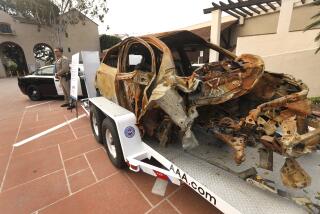Drunk driving study: Car interlock devices really do help
- Share via
Drunk drivers receiving their first conviction were less likely to be repeat offenders if they were forced to have alcohol interlock devices on their vehicles, according to a new study.
Looking at alcohol-impaired driving convictions in Washington, the Insurance Institute for Highway Safety found that the rate of repeat offenders has fallen 12% since the state expanded its interlock requirement eight years ago to include everyone convicted of driving under the influence.
Previously, Washington required the device, which a driver must blow into before starting the vehicle, for repeat offenders, drivers caught with high blood-alcohol levels and those who refused an alcohol test.
“Drivers with previous impaired-driving convictions are overrepresented in alcohol-related fatal crashes, so deterring people from re-offending is a good first step to reduce the death toll,” said Anne McCartt, the institute’s senior vice president for research and the study’s main author.
“As this study shows, the more offenders are covered by an interlock law, the better it works,” she said. The study was released Tuesday.
The institute is supporting federal legislation that would push states to require interlocks as a result of all impaired-driving convictions, by linking receipt of federal highway funds to such action. Opponents say the device should be used only for repeat offenders and people with alcohol levels almost double the legal limit.
Washington is one of 15 states that require everyone convicted of drunk driving to install an interlock device for some period of time if they want to drive, the insurance group said. An additional 22 states require the device for repeat offenders and those with high blood-alcohol levels.
California has a pilot program in four counties — Alameda, Los Angeles, Sacramento and Tulare — that requires first-time offenders to use the interlock device.
The institute said it believes that interlock devices present a greater obstacle to drunk driving than penalties such as a driver’s license suspension.
“It’s easier to drive illegally with a suspended license than it is to defeat an interlock,” McCartt said.
More to Read
Inside the business of entertainment
The Wide Shot brings you news, analysis and insights on everything from streaming wars to production — and what it all means for the future.
You may occasionally receive promotional content from the Los Angeles Times.











